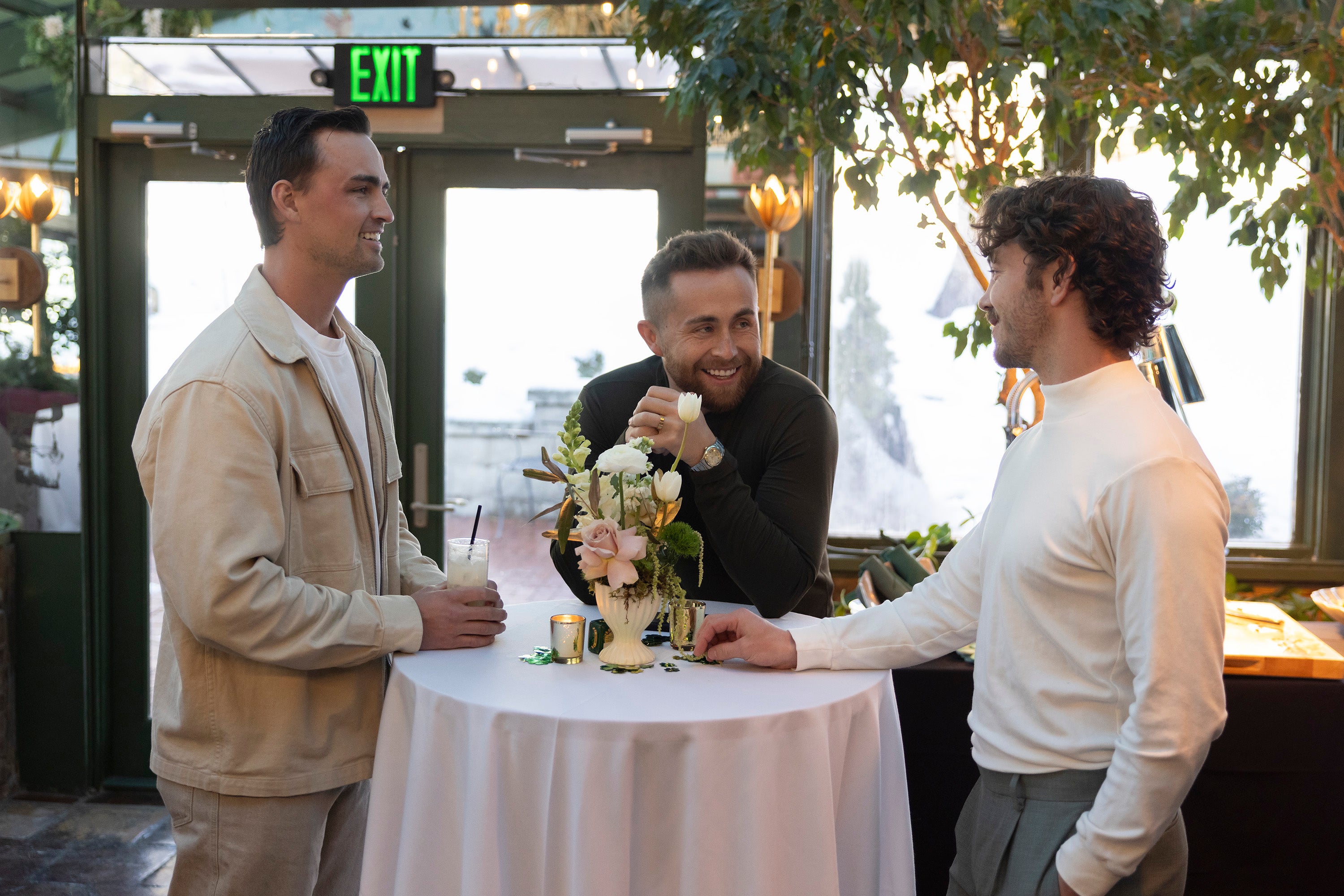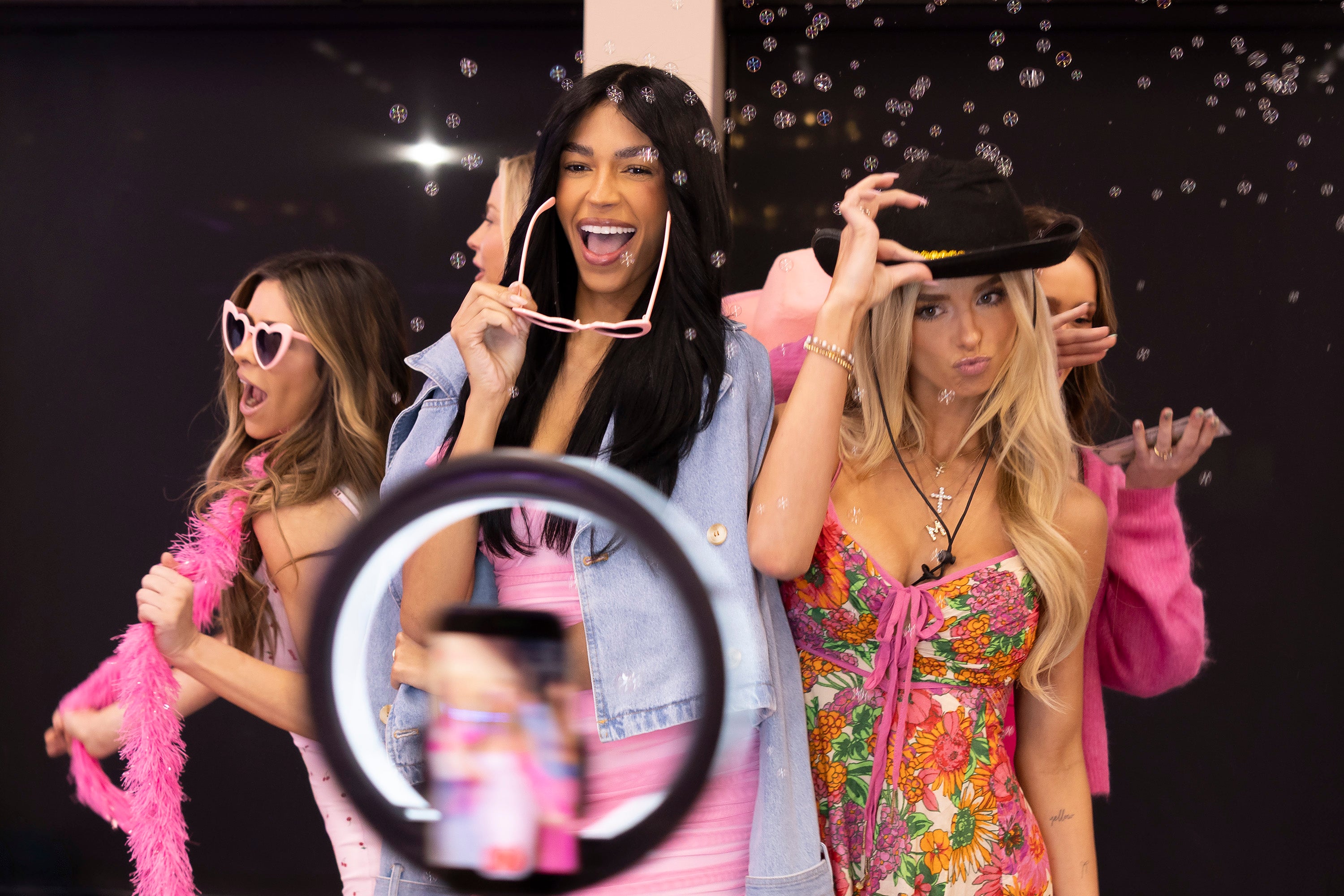The women of MomTok, the glossy-haired group of twenty-something influencers who make up the cast of Hulu’s The Secret Lives of Mormon Wives, have built an empire. The group — all current or former members of The Church of Jesus Christ of Latter-day Saints — have secured book deals, brand sponsorships and spots on Dancing with the Stars. It’s no surprise, really, since Secret Lives became Hulu’s most-watched unscripted premiere of 2024, proving to be just as messy as a Real Housewives installment, with a side order of contentious theology. Think catfights, icy brunches and plastic surgery recovery scenes in between aerial shots of temples and churches.
Reality TV fans have lapped it up — but for some Latter-day Saints (their preferred term over Mormons), the series doesn’t sit well. “This is not the first time that the film and TV industry has misrepresented us, or sensationalized things in some way,” says Dallin Shumway, a 27-year-old social worker in Texas. He can see why the show has been successful: the title alludes to an assumed secrecy associated with the religion. “The angle always seems to be… these are the crazy Americans who live out West. It doesn’t really represent the life of a Latter-day Saint very clearly at all — at least if we’re talking about self-identified, practising members of the faith.”
Ken Brueck, a 43-year-old Latter-day Saint who lives in Utah and works in software, jokingly tells me that he would prefer the show to be named: “The Open Lives of People that Left the Church.” He says that Hulu’s title panders to the stereotype that Latter-day Saints are “these wholesome people, but secretly we’re oppressed and dying to break free, and we’re living this double life.” The reality is quite different, he says. “That’s where Secret Lives makes me uncomfortable, because there’s gonna be some percentage of people who will form their opinions of people like me based on the people in that show, and the things they do.”
Secret Lives returned for a third season on Thursday, following the cast as they grapple with an affair that sent shockwaves through MomTok and the spousal group DadTok. MomTok — created in 2022 by cast members Taylor Frankie Paul, Whitney Leavitt, Mayci Neeley and Mikayla Matthews — began as a space for dance videos and relatable parenting content. The series itself was born in the wake of a “soft swinging” scandal that nearly tore the clique apart, after Paul revealed in a TikTok livestream that she and her husband were divorcing following intimate encounters with other couples in Salt Lake City. The fallout from the controversy almost broke MomTok as other members saw themselves sucked into the swinging accusations. Still, there are plenty more issues for them to reconcile across the newest 10 episodes.
Throughout the series, the cast are engaged in an ongoing discussion about the social conservatism of their faith — where sex before marriage and homosexuality are prohibited — and whether they can change it. In the first episode of the series, Paul admits that she was forced into marrying her first husband by her mother and the Church because they were sexually active. Other stars have discussed wanting to “break stigmas” and modernize the faith. A handful of them drink alcohol; some abstain in line with the Church’s doctrine, but have looser interpretations of its teachings when it comes to ketamine therapy.

Last year, the Church issued a statement saying that recent media portrayals sometimes rely on “sensationalism and inaccuracies that do not fairly and fully reflect the lives of our Church members or the sacred beliefs that they hold dear.” Though it did not name Hulu or Secret Wives, the memo said that some recent productions “resort to stereotypes or gross misrepresentations that are in poor taste and have real-life consequences for people of faith.”
When it comes to the portrayal of women in the series, Dr Jennifer Finlayson-Fife, a Chicago-based sex therapist and marriage counselor who works with people in the faith, says that the show feeds into the narrative that women in the Church are “hapless” and want to break away. “It’s salacious and immature,” she says. “It makes women look like repressed idiots, and then [the women in the series] are busting out, but in this very idiotic way. They’re breaking the bounds, but they're doing it in this very indulgent, reckless way.”
Much of Dr Finlayson-Fife’s work is helping people establish their identity in a religious culture that she calls “high demand.” She says that there is “some truth” in how people feel restrained by these demands. “What is true to a lot of Latter-day Saints’ experience is a sense that there's a narrow way in which you should live to be considered a good Mormon, and women have a particular version of it — you have to be a virgin at marriage, have children, to support your husband.” In many ways, the women of MomTok are responding to this. “It’s as if they’re freeing themselves, right? And I would just argue that they aren’t free at all.”
Women from across the Latter-day Saint community have spoken out about the series since its release. Sarah Jane Weaver, editor of the Deseret News in Salt Lake City, called the show’s cast members “outliers” of the Church who are “profiting” by flaunting their bad behavior, adding that the show “mischaracterizes what it means to be a member of The Church of Jesus Christ of Latter-day Saints.” “The Secret Lives of Mormon Wives is not a representation of me or my friends or my daughters or their friends or of the women I have met across the globe,” she wrote in an article published last year.
Finlayson-Fife says that people not familiar with the faith would be surprised that “Mormons are exactly like them.” “These are normal people trying to have happy marriages and families, trying to live lives that have meaning.”
When it comes to other criticisms of the series, some Latter-day Saints have taken issue with the show’s lack of dialogue about the faith, even as it leans heavily on religious imagery — from sweeping temple shots to Church steeples dotting the Utah skyline. David Snell, host of the Keystone podcast, says that the show uses his religion as “clickbait.” “It felt forced to me,” he says. “They put ‘Mormon’ in the title and their inclusion of Latter-day Saint buildings felt sort of like a desperate attempt to tie the Church into the series.”
Snell adds that it is “sad” that his faith “has become somewhat of a spectacle to people… It makes you feel a little bit like a zoo animal sometimes.”
For his podcast, Snell watched all 10 episodes of the latest series of the show and recorded his live reaction. He found that there was a deliberate vagueness in the show over which members of MomTok and DadTok are still active in the religion. “I wish they were more transparent about where they're actually at with their faith, because then I think that would set proper expectations for viewers who might be less familiar with what an actual orthodox Latter-day Saint actually looks like,” he tells me.

All of the interviewees I speak with acknowledge that reality TV carries a certain trashiness and isn’t meant to be taken too seriously. It might not all be bad press for the faith, either. Snell can see how the show might actually help destigmatize long-standing stereotypes about the Church, and even reveal how nuanced the culture is. “Some people have viewed members of The Church of Jesus Christ of Latter-day Saints as if they are dressed like pioneers, and they’re out milking cows all the time,” he says. “There is some value in portraying Latter-day Saints as people that come in all shapes and sizes, and that they're not just a monolith. Because on an individual level, you'll find people all over that spectrum. But generally, ‘orthodoxy’ is somewhere in the middle.”
Life within the Church, Shumway points out, exists on a spectrum. He has friends who have left the Church and others who lead very orthodox lives. “For those who have left, I believe that their experience is valid, you know? I hope that we can all just do a better job of seeing each other and trying to make it work.” He points out that Secret Lives does highlight criticisms of the Church, which he does not deny. “I would be remiss if I tried to paint this picture where, in terms of all the criticism that the Church gets, it’s all invalid and it's always misunderstood, because that's simply not the case,” he says. “You can’t have an institution as large as the Church of Jesus Christ of Latter-day Saints without some criticism that is actually warranted.”
“We are real people and we’ve got our own stories,” adds Snell. “And I think Secret Lives is an extreme end of that spectrum, but I do see value in the show as something that might help people move away from traditional stereotypes,” he pauses. “But, you know, that’s me looking for the silver lining.”
All three seasons of ‘Secret Lives of Mormon Wives’ are now available on Hulu in the U.S. and Disney+ in the U.K.







